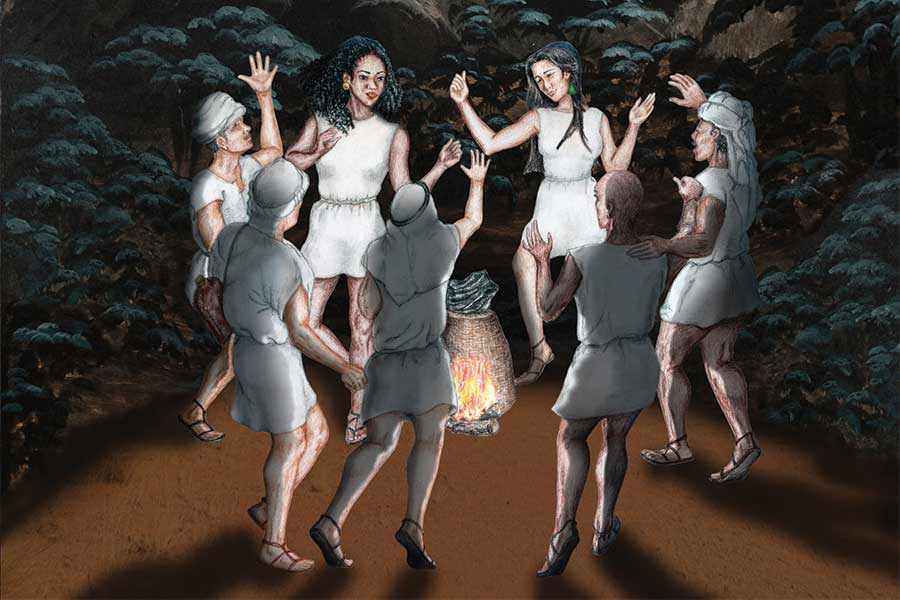“A Meteor Shower,” by out lesbian author and activist Martha Shelley, is a compelling feminist historical novel set in the ancient Middle East.
Even for those who have not read the previous two entries in her trilogy (“The Stars in Their Courses” and “The Throne in the Heart of the Sea”), the narrative is easy to follow. Shelley immerses the reader in the world of the novel by providing maps, character charts (indicating which characters are historical and which are fictional), a glossary, a calendar, source notes and more. When a character reflects on an earlier relationship or is haunted by a past event, new readers won’t miss a beat.
The story opens with Bez, a “mutarajjul” — a woman dressed in men’s clothing — in bonds. Bez, a muralist, is described as a man-woman. She has been captured and hopes to reunite with her lover, Tamar, a doctor. Tamar, who works for Queen Jezebel, leaves with a ransom to find Bez, and on her journey, she encounters a young orphan girl, Arneb, whom she rescues from being sold as a virgin.
Shelley sensitively depicts the opportunities and limitations for women in ancient society, particularly their fears of being sold and sexually assaulted. One absorbing episode involves a young girl who no one will marry because she has been sexually abused by a member of the royal family; she is paid off and sent away because of the politics of the time. There are also rules for Queen Jezebel, who is widowed over the course of the novel. Perhaps the most satisfying feminist subplot features Bez and Tamar’s friend, Munapirtu, a pastry chef, who at first yields to her husband Wullu’s demands. Wullu, who is in hiding, hopes to flee with Munapirtu, and he claims (as was customary at that time) that his wife’s earnings belong to him. Bez and Tamar express dismay and help Munapirtu gain her independence.
As for the book’s depiction of lesbianism, in addition to the widely accepted relationship between Bez and Tamar, Queen Jezebel briefly acts on her attraction to one of her husband’s other wives, Timna. (Alas, the book skimps on depicting much same-sex romance; the women are busy ruling, working and fighting for their survival).
“A Meteor Shower” follows several plotlines and characters beyond just the central women. Some episodes involve Tamar’s cousin, the prophet Elijah, as well as his disciple, Elisha ben Shafat. One narrative thread involves Tamar’s efforts to warn Elijah that he has been the subject of a rumor involving the king, and his life may be in jeopardy. A series of deaths, of King Ahab, his son Ahaziah, and others, call to mind “Game of Thrones.” When Ahab’s son Yoram ascends to power, he must contend with financing war and taking back the region of Moab, which provides some nifty action.
The storylines are episodic, but each holds interest. Arneb is a spunky character, and her coming of age and developing relationship with Eitan, the brother of her friend Keturah, is terrific. Shelley explains how Arneb’s engagement will protect her from being touched: “Any man who dared lay his hands on Arneb would be stoned in the village square.” Such details reflect Shelley’s deep historical research.

At times the author gets a bit mired in excessive historical detail, as when she endlessly lists the food being prepared and served, or defines the meaning of months and events. With chapters depicting poverty, drought, famine and deaths caused by an epidemic of winter fever, readers might wonder when the plague of locusts will descend, but thankfully, that doesn’t happen.
There is also statecraft and inventive cursing. In one memorable scene, Jezebel shouts about someone being so putrid a hyena would not have sexual congress, although she is far less polite.
Shelley’s writing is brisk throughout the novel, and she is best when it comes to depicting omens, such as the titular meteor shower, a fabulous chapter, or a “multitudinous cloud of storks,” a portentous image of “black and white wings spread like capes wide enough to cover a man, soaring, embracing the hot autumn wind.” However, she does employ a few clunky metaphors, such as “He stepped on that cockroach of an idea.”
“A Meteor Shower” manages to end on a note of ambiguity, even while maintaining historical accuracy in its portrayal of Jezebel’s death. Readers may wish for more resolution, as they are left to imagine the futures of Bez, Tamar and Arneb. But any disappointment in that regard is ultimately a result of the book’s strengths, and not a criticism. Readers will care so much for these characters, they won’t them to be left behind.
